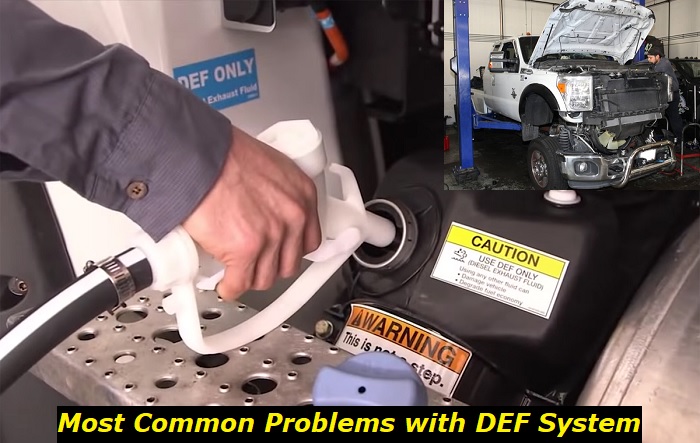Many diesel car owners use DEF in order to keep their vehicles running well and pollution-free. While these systems are generally considered reliable, like any machinery, they can experience issues that may be difficult to diagnose or repair.
With the right knowledge and troubleshooting tips, however, it is possible to uncover why your DEF system has stopped working properly and what you can do about it. In this article, we'll cover some of the most common DEF system problems and give our readers optimal solutions so they can get back on the road as quickly and safely as possible!

What is DEF, and why is it important for diesel engines?
DEF, otherwise known as Diesel Exhaust Fluid, is an essential component of modern diesel engines. This special fluid is composed of urea and deionized water, helping diesel vehicles to reduce their emissions of nitrogen oxides (NOx). DEF has been around since 2010 when the Environmental Protection Agency (EPA) issued regulations that required diesel engines to have these emissions reduced.
The result? All newer diesel vehicles must now be equipped with catalytic converters that use DEF to clean harmful pollutants out of the engine's exhaust. This precautionary step protects both humans and the environment by keeping toxins out of the air we breathe.
The problems that can occur with a DEF system
If your car has a DEF system, you might have heard horror stories about the problems that can crop up with this technology. From blockages to contamination, there's no getting away from the fact that problems do occur - and sadly, when they do, it's not always easy to get them fixed.
In fact, it often feels like DEF systems have been set up to create more issues and costs than they should - but the good news is that knowing what could go wrong makes it easier for you to prevent those issues in the first place.
1) Contamination
Contamination in a DEF system is a serious matter. It's an issue that should not be taken lightly, as it can lead to big problems down the road. DEF systems are engineered to work fluidly and efficiently, so even the smallest amount of contamination can throw the whole system off balance.
The most common causes of contamination include improper handling of DEF fluids, external or internal leaks, faulty valves, pipes or hoses, and dirt from clogged filters. All of these scenarios can create costly disruption and long periods of downtime for DEF systems.
Fortunately, routine maintenance and preventative steps like using chemical-compatible hoses and valve safeguards can help ward off any potential issues with contamination.
2) DEF tank blockage
It's a bit ironic, isn't it? A system designed to help your vehicle run better can cause some major issues on its own. We're talking about a dreaded blocked DEF tank, one of the most common problems with DEF systems. However, a blocked tank isn't always disastrous and can often be fixed by running an appropriate additive through the system.
Still, it's definitely a nuisance you'll want to avoid in the first place. Of course, that means making sure you keep up with regular maintenance and pay attention to signs of potential blockage because it's much easier (not to mention cheaper) to prevent than repair!
3) Pump malfunctions
Pumps can be a real headache when it comes to DEF systems. These seemingly harmless components can cause a lot of problems and require an experienced mechanic to handle them! Malfunctions can range from the stagnant flow of urea solution to pumping uncontrolled amounts of this essential material. Therefore, it is so important to make sure the pump - and other parts of the DEF system - are up for the job!
4) Malfunctioning sensors
Malfunctioning sensors can truly be a nightmare for diesel car owners. DEF systems are important because they reduce emissions from diesel motors, but when their sensors fail, it can lead to a plethora of other problems like higher emissions and reduced performance. It's even worse because these problems may not be immediately identifiable until you take the car for servicing or diagnosis.
Thankfully, there are various ways of detecting malfunctioning sensors in DEF systems, such as checking engine codes and warning lights. As a responsible diesel car owner, familiarizing yourself with the signs of defective sensors will help you identify them faster while keeping your vehicle in optimal condition.
5) Too much soot in the exhaust pipe
Problematic soot accumulation can come from insufficient exhaust treatment, but it's easy enough to tell if it's happening to your vehicle as there'll be a significant amount of smoke coming out of the tailpipe.
This issue should be addressed as soon as possible because, if left unchecked, it will affect your DEF system's performance and could cause serious damage. By getting your DEF system checked and using high-quality diesel fuel, you can likely avoid this problem before it even occurs!
So make sure you keep your DEF system clean and secure - only then can you be sure to stay out of trouble!
Solutions to common DEF system problems
Have you recently experienced DEF problems in your diesel car? If so, then don't worry because there are solutions that can help you out.
- Avoid contamination
Make sure that the opening of your DEF fluid container is clean before pouring DEF into the tank. It is important to remember that DEF is very sensitive to contamination. Exposure to dust and debris can cause a lot of issues in the DEF system and lead to unwanted downtime.
Use a moist cloth or one that has been treated with a disinfectant solution so that no unseen dirt transfers to your DEF fluid. Make it a habit; pour your fluids with confidence, knowing they are free of residues that could harm your vehicle!
- Reset your DEF tank refill level
Having to reset your DEF tank refill level, while a seemingly easy task, can quickly become complicated if you don't have a few key pieces of information. Knowing the manufacturer's instructions for resetting is always recommended and should be the first step in the process. The resetting procedure varies, depending on the car brand you're driving.
Therefore, you should always check the manual to make sure that you are following the right procedure. Before attempting to begin such a task, make sure that the DEF tank is actually full. Resetting will make no sense without an accurate reading of how much fluid is in the tank.
- Replace DEF filers and injector nozzles
Replacing the filter can help in some cases when the DEF pump is running too slowly. It might also be necessary to replace your DEF injector nozzle as these tend to get clogged over time and prevent fluid from flowing properly.
- Proper handling
When dealing with DEF, it's important to follow the proper safety guidelines. Make sure the DEF is stored in a cool and dry environment, away from any direct heat or sunlight sources. Additionally, take special care not to get any of the DEF on your skin, as it can cause irritation and other health risks.
Therefore, it is a good idea to wear protective gear when you're handling large quantities of DEF to ensure that it doesn't come into contact with your skin or clothing.
Conclusion
Hopefully, this article has helped you to understand a little more about DEF and why it's important for your diesel engine. While there can be some problems with the system, there are also solutions to those issues. As long as you avoid contamination, keep an eye on your DEF levels, and proactively maintain your system, you should be able to avoid any major problems.
Have you ever had a problem with your DEF system? Let us know in the comments below!
About the authors
The CarAraC research team is composed of seasoned auto mechanics and automotive industry professionals, including individuals with advanced degrees and certifications in their field. Our team members boast prestigious credentials, reflecting their extensive knowledge and skills. These qualifications include: IMI: Institute of the Motor Industry, ASE-Certified Master Automobile Technicians; Coventry University, Graduate of MA in Automotive Journalism; Politecnico di Torino, Italy, MS Automotive Engineering; Ss. Cyril and Methodius University in Skopje, Mechanical University in Skopje; TOC Automotive College; DHA Suffa University, Department of Mechanical Engineering






Add comment